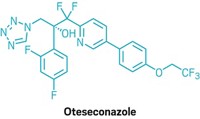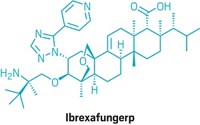Advertisement
Grab your lab coat. Let's get started
Welcome!
Welcome!
Create an account below to get 6 C&EN articles per month, receive newsletters and more - all free.
It seems this is your first time logging in online. Please enter the following information to continue.
As an ACS member you automatically get access to this site. All we need is few more details to create your reading experience.
Not you? Sign in with a different account.
Not you? Sign in with a different account.
ERROR 1
ERROR 1
ERROR 2
ERROR 2
ERROR 2
ERROR 2
ERROR 2
Password and Confirm password must match.
If you have an ACS member number, please enter it here so we can link this account to your membership. (optional)
ERROR 2
ACS values your privacy. By submitting your information, you are gaining access to C&EN and subscribing to our weekly newsletter. We use the information you provide to make your reading experience better, and we will never sell your data to third party members.
Biological Chemistry
Agent Helps Carbapenems Fight Bacterial Resistance
Coadministration of aspergillomarasmine A and antibiotic protects lethally infected mice
by Stu Borman
June 30, 2014
| A version of this story appeared in
Volume 92, Issue 26
Scientists have identified a natural product that inhibits an enzyme that bacteria use to disable carbapenem β-lactams, antibiotics of last resort for pneumonia and other infections. Bacteria resist carbapenems by expressing serine- or metallo-β-lactamases that destroy the β-lactam ring the antibiotics use to kill them. Several serine-β-lactamase inhibitors are used as antibiotic adjuvants, agents coadministered with antibiotics to fight infection. But no metallo-β-lactamase inhibitors have been identified or approved. Now, Gerard D. Wright of McMaster University, in Ontario, and coworkers have found such an inhibitor by screening an in-house collection of microbial natural products for antibiotic activity against resistant bacteria (Nature 2014, DOI: 10.1038/nature13445). The agent, the fungal natural product aspergillomarasmine A, inhibits metallo-β-lactamase and related enzymes. In experiments on mice infected with a lethal dose of pneumonia bacteria with metallo-β-lactamase-based antibiotic resistance, a carbapenem drug or aspergillomarasmine A failed to protect the mice. But when administered together, they caused 95% of treated mice to survive. Aspergillomarasmine A could help in the fight against enzymes “that have become rapidly global and result in significant human morbidity, particularly in developing countries,” the researchers note.




Join the conversation
Contact the reporter
Submit a Letter to the Editor for publication
Engage with us on Twitter